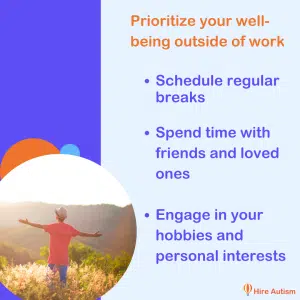Job searching is hard, even for the most qualified and skilled candidates. Whether you’re just starting your job search or several months into the process, it’s easy to get discouraged. Luckily, this article provides strategies and tips to help you stay motivated from the initial search to the offer letter.
Don’t Neglect Your Interests Outside of Work

To stay motivated, remember that a job is just a job. Your worth and identity as a human being are far more nuanced than your job title. It may be tempting to spend every waking moment job searching and preparing for interviews; however, doing so can quickly lead to burnout.
Instead, prioritize your well-being and life outside of work. Schedule regular breaks, spend time with friends and loved ones, and engage in your hobbies and personal interests. Not only will taking breaks keep you refreshed and focused-it can also help you engage in conversation if an employer asks about your interests outside of work. Pursuing your hobbies and other interests outside of work can also help expand your network, maintain a sense of normalcy and schedule, and retain or gain self-confidence.
Throughout your job search journey, remember to engage in activities you enjoy, spend time with your support network, and nurture your mental and emotional well-being.
Avoid “Doomscrolling” and Catastrophizing
Maybe you’ve just been ghosted by your dream job. Or perhaps you’ve worked a few jobs already but can’t find the perfect fit. Regardless of your situation, it’s easy to get discouraged and want to give up.
But one surefire way to not get a job is to stop applying. While it’s okay and even healthy to occasionally share your frustrations with others, spending too much time reading negative blog posts, articles, and comments online about how hard it is to get a job can hurt your confidence.
Instead of “doomscrolling,” use the time more productively, whether it’s updating your resume, spending time outdoors, exercising, reconnecting with old colleagues, or attending networking events.
It also helps to reframe your thinking. Rather than engaging in negative self-talk, challenge and reframe your thinking about your job search. For example, instead of saying, “No one will hire me because I’ve been out of work,” try reframing to something like, “Taking this time for myself has given me more energy to contribute to my next role.” Staying optimistic not only keeps you motivated but can help you stand out from the other candidates.
Focus on What You Can Control
Unfortunately, much of the job search process is out of our control. Maybe that dream company or industry you had your eye on just had a round of layoffs. Maybe you had a strong interview, but the candidate who got the job had experience with the niche software they were looking for. Or maybe the hiring manager loved you, but their boss decided to freeze recruiting.
Are all the above scenarios frustrating? Absolutely. But they’re also common—and not a reflection of your value or potential. Feeling disappointed or even a little mad is okay when things don’t go our way. But don’t give up!
Not getting an offer for every job you apply for doesn’t mean you’re unqualified. It just means that particular role isn’t meant to be. Instead, redirect that energy into refining what you do have power over. You can’t control who else applies to the job you want, but you can spend that extra 10 minutes revising your resume or cover letter. You can’t dictate market trends, but you can respond accordingly. And above all else, you and you alone control your attitude towards the situation.
Advice submitted by Navigator, Brigit P.
Embrace a growth mindset: It’s essential to view the job search process through a learning lens. A job search can be fraught with challenges and roadblocks – leveraging a growth mindset
Set achievable goals and celebrate small wins: Break your search into manageable goals and reflect on daily and weekly progress. Recognize and reward your incremental achievements, however small. This reinforces the belief that persistent effort leads to growth over time.
Stay adaptable: Be open and willing to shift your strategy and try a new approach. In a job search, it is advantageous to do so and will re-energize you with a fresh perspective along the way.
Leverage available resources: Consider consulting with a trusted mentor or career coach to help optimize your search. These professionals can assist you in homing in your strength areas, identifying any gap areas, and developing important competencies. They can offer invaluable informational feedback that will help motivate you during your search.
Know your vision: When your vision is crystal clear, so is your purpose. It’s all too easy to get lost in a flurry of job search activities, but with a strong purpose, we are propelled forward by the vision and find meaning in our search.
Resources:
- How to Set the Right Goals and Stay Motivated | Ayelet Fishbach | TED
- 9 Tips for Finding Motivation for Your Job Search
- What Makes a Good Job Applicant? 10 Traits That Get Noticed
- How Hobbies Outside of Work Boost Your Career
- 6 Creative Ways To Beat Job Search Burnout
- Reframing Your Negative Job Search Thoughts
- Reframing Your Job Search: Turning Negative Self-Talk into Career Success


